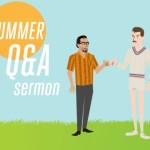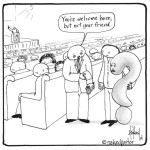We run our website the way we wished the whole internet worked: we provide high quality original content with no ads. We are funded solely by your direct support. Please consider supporting this project.

Changing Beliefs
Stephen Mattson is a follower of ReKnew and a member of Woodland Hills Church who posted a piece on Sojourners titled Christians: It’s NOT a Sin to Change Your Beliefs. He points out that doubt and questions are a natural and needed part of any Christian’s life, and our community needs to change the ways we respond to one another when these things surface. Check it out!
From Stephen’s article:
Theoretically, Christians can go from preschool to seminary hearing the exact same religious doctrines. Theologies are often considered too “valuable,” “right,” and “holy” to change or question. Therefore, pastors debate instead of dialogue, professors preach instead of listen, schools propagate instead of discuss, and faith-based communities ultimately reject any form of honest questioning and doubt.
Indoctrination is preferred over critical thinking, certainty is favored over doubt, and we expect our leaders to offer black-and-white answers. A change of theology is viewed as weakness, poor exegesis, and a sign of insecurity. “If they change their views now, how can I believe anything they say in the future?” Christians often perceive change as a break in trust and a loss of identity.
Category: General
Tags: Belief, Change, Curiosity, Doubt, Faith, Mercy, Q&A, Sojourners, Stephen Mattson
Related Reading

How do you respond to Matthew 21:1–5?
Jesus commanded his disciples, “Go into the village ahead of you, and immediately you will find a donkey tied, and a colt with her; untie them and bring them to me. If anyone says anything to you, just say this: ‘The Lord needs them.’ And he will send them immediately” (vs. 1-4). Though this verse…

Reflecting on the Conference and Cynicism
We had such a great time this weekend at the Faith, Doubt & the Idol of Certainty conference. People came from all over the United States and it was good to get a chance to connect. We’re more convinced than ever that God is up to something beautiful and real. You’ll be hearing more about…

An Author Repents
In 1969, 19 year old William Powell wrote the now classic The Anarchist Cookbook. He was very angry at the time that the US military was pursuing him to fight in the Vietnam War. It’s basically a “how-to” book on surviving a violent government action against its own citizens. Today William is on a very…

Why do you espouse Open Theism?
Open Theism refers to the belief that God created a world in which possibilities are real. It contrasts with Classical Theism which holds that all the facts of world history are eternally settled, either by God willing them so (as in Calvinism) or simply in God’s knowledge (as in Arminianism). Open Theists believe God created…

Greg and Paul Tag Team to Answer Your Questions
Greg Boyd and Paul Eddy answered questions submitted from Woodland Hills Church and podcasters during all three services this last Saturday and Sunday. They covered a wide range of topics so, chances are, you’ll find something here of interest to you. You can download audio or video from the three services below: Saturday evening service…

